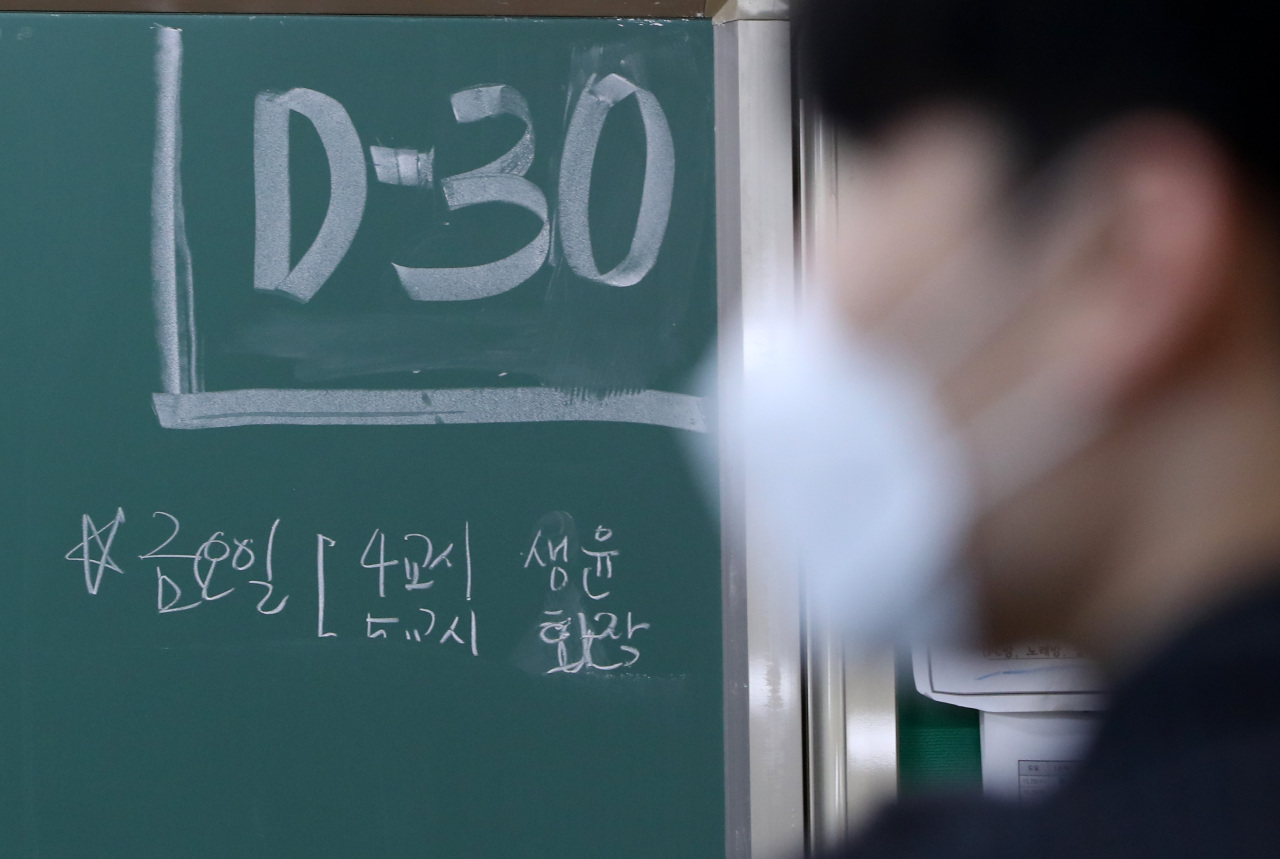
Third-year students at Chuncheon High School in Gangwon Province study in their classroom Tuesday in preparation for the upcoming College Scholastic Aptitude Test, also known as Suneung, just 30 days ahead of the big day. (Yonhap)
Amid a prolonged battle against the coronavirus, South Korea is set to hold another massive-scale national event next month, the annual college entrance exam, more widely known here as the Suneung.
On Dec. 3, approximately 500,000 students will sit the back-to-back marathon tests from 8:40 a.m. to 5:40 p.m. at 1,352 exam sites across the country set up in accordance with quarantine protocols.
Education Minister Yoo Eun-hae on Tuesday vowed a successful administration of the Suneung, asking for concerted efforts from the government, businesses and members of the public in the coming weeks to stabilize the coronavirus situation as much as possible.
Korea’s daily new infection count has recently hovered around 100.
“The Education Ministry will work with related agencies, local education offices and regional governments to make sure that students safely take the Suneung in December amid the COVID-19 situation,” said the minister, briefing the Cabinet meeting on its Suneung plans.
“The best way to curb (infection risks during the Suneung) is by having everyone in Korea closely follow the government’s virus control guidelines and prevent cluster infections,” she said.
Under the ministry’s guidelines unveiled Tuesday, all high school classes will move online in the week leading up to the exam, in order to minimize transmission risks among students.
Each testing room will house up to 24 persons, down from the usual 28, to ensure distance among test takers. Plastic dividers will be installed on desks.
Mask-wearing will, of course, be mandatory throughout the exam. Test takers are asked to bring spare face masks just in case. Body temperature checks will be conducted on everyone entering the testing site.
Unlike previous years, visits to the exam room will not be allowed on orientation day, a day before the exam.
“The guidelines we introduced for this year’s Suneung are based on the testing center protocols made by disease control authorities in April,” said Cho Hoon-hee, head of the university admissions policy division at the Education Ministry.
“We made them a lot more specific, as the safety of test takers is the top priority.”
The ministry’s special team held regular meetings with disease control experts and officials, the official added. The latest meeting was held Tuesday morning among Yoo, Korea Disease Control and Prevention Agency Commissioner Jeong Eun-kyeong and three local virus experts.
The ministry also took cues from some past successes where large-scale in-person events were held without a single participant becoming infected, and strived to build on them, Cho added.
Despite the persistent threats of the COVID-19 pandemic, Korea went ahead with several major in-person exams, both private and public. No confirmed cases have been reported among the exam-takers.
Some of the measures in place for the Suneung resemble those imposed for regular civil servant exams and written recruitment tests for large public enterprises.
In the case of civil servant exams, the government has even allowed those under self-quarantine to take them at home or in hospital if they submitted requests beforehand.
As the Suneung is a life-defining event for college hopefuls, the Education Ministry has taken a step further, allowing COVID-19 patients to take the annual exam.
Students confirmed to have the virus can take the Suneung in designated hospitals or government institutes. They will have to be admitted to the facilities where the test will be conducted three weeks prior to the exam.
Each Suneung test site will be required to prepare separate testing rooms for those exhibiting COVID-19 symptoms on test day. Each such room will have up to four test-takers, but can accommodate more under special circumstances.
“We will have more detailed guidelines for students and proctors in coming days,” Cho of the ministry added.
Emboldened by the successful management of the April general elections, which recorded the highest voter turnout in 28 years, Korea has not shied away from holding scheduled national events.
But the Suneung could turn out to be a greater challenge, experts said.
“It is similar to other national events in the aspect that a large number of people are concentrated in areas, and what the government has announced so far is in line with what should be followed for big events during the coronavirus outbreak,” said Dr. Chun Eun-mi, a lung specialist at Ewha Womans University Medical Center.
“But the Suneung is different in that people will have their face masks off for some time in between, and it’s a lot longer than other exams, which could result in some students loosening up their face coverings from time to time, so danger still remains.”
As the exam lasts nearly nine hours, test-takers have lunch in the exam room. Chun suggested rapid tests as a way to prevent virus transmission among test-takers and proctors.
Other experts said the overall virus situation should be put under control to ensure safety on the exam date, pointing to a recent increase in school outbreaks.
Infection clusters at school and among students could spark virus worries ahead of the big test, said Dr. Eom Joong-sik, an infectious disease specialist at Gachon University Gil Medical Center.
Close to 100 students had been diagnosed with COVID-19 by Monday since in-person classes expanded in mid-October.
The total caseloads from May, when school reopened after weeks of closure during the first wave of the virus outbreak, is 754 for students and 142 for faculty members, according to Education Ministry data.
“There is a limit to how much the authorities can control the virus on the exam day, and authorities should focus more on controlling the virus situation among student bodies with just a month left until the Suneung,” Eom said.
By Ko Jun-tae (
ko.juntae@heraldcorp.com)






